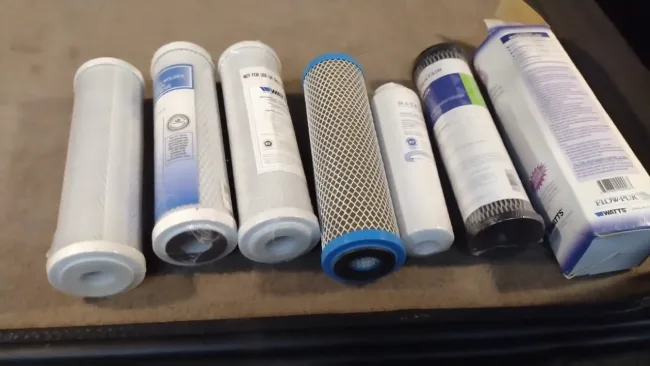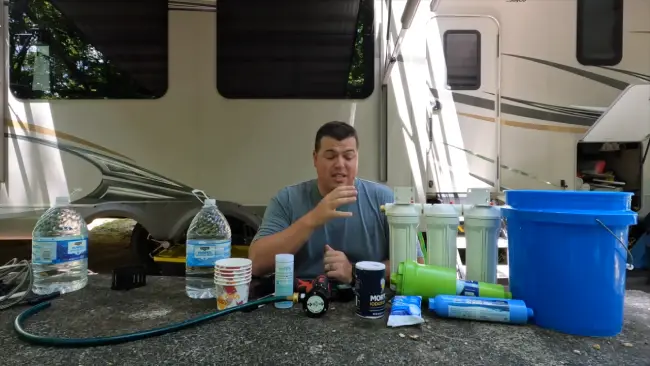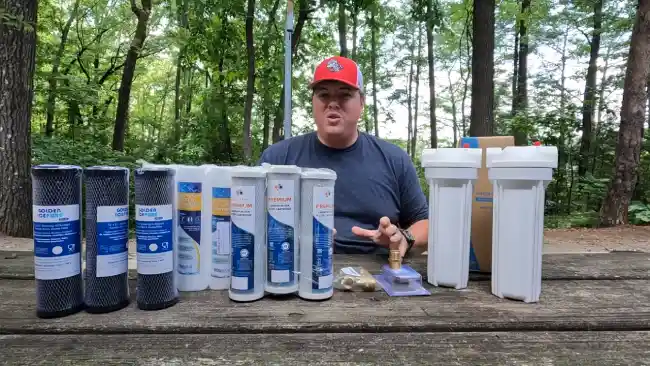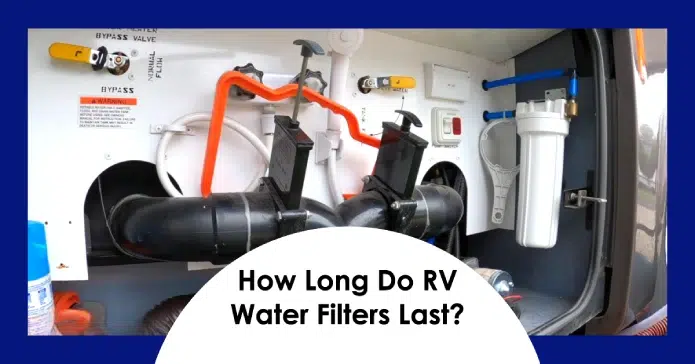Last Updated on December 24, 2023
After installing your RV water filter, you need to know when to replace it. The longevity of RV water filters is dependent on several crucial factors. These comprise the caliber of the filter itself, the quantity of water utilized, and the quality of the filtered water.
Understanding these factors can help you determine when to replace your RV water filter and ensure your water remains clean and safe to drink. But, on average, most RV water filters last between three to six months before they require replacement.
Let’s discuss how long your RV water filter can actually keep your water spick and span. Plus, how do you know it’s time to swap it out?
How Long Do Rv Water Filters Last: Three Factors

If you want to know how long your RV water filters will last, there are a few factors you need to consider. These are the factors at a glance:
2. Water Usage and Frequency of Use
Let’s get into it:
1. Quality of the filter
The filter material greatly influences its effectiveness in removing a wide range of contaminants. Here are some factors to consider when evaluating the quality of an RV water filter:
- Material: Look for filters made from high-quality materials that are designed to last longer and resist wear and tear.
- Micron rating: The smaller the micron rating, the more contaminants the filter will be able to remove.
- Certification: Choose filters that have been certified by reputable organizations, such as NSF International or the Water Quality Association.
- Features: Some filters have additional features, such as a built-in pressure regulator or a multiple-stage filtration system, that can enhance their effectiveness and lifespan.
As you consider the quality of your RV water filter, keep in mind that investing in a high-quality filter will ultimately save you time and money in the long run.
2. Water Usage and Frequency of Use
Using less water and limiting the frequency of use will extend the life of your RV water filter, saving you hassle and money in the process.
It’s easy to get carried away with water usage for showers, dishes, and other daily activities while on the road. The more water you use, the more strain the filter puts on, leading to faster wear and clogging.
To combat this, try to be mindful of your water usage and limit your showers to a reasonable amount of time.
Also, consider investing in a low-flow showerhead and faucet aerators to conserve water and reduce strain on your filter.
The number of occupants in the RV also affects the filter’s lifespan. More people using water will require more frequent filter replacements.
If you’re traveling with a family or group, consider staggering shower times or using a campground’s facilities to reduce the strain on your filter.
3. Water Quality
Be mindful of the quality of water you’re filtering in your RV, as it can greatly impact the lifespan of your filter.
Different water sources have varying levels of contaminants, such as sediments, bacteria, and chemicals. High levels of these contaminants can reduce the filter’s lifespan, as it works harder to purify the water.
To ensure the longevity of your RV water filter, consider the following factors that can affect the water quality:
- Location: Water from different areas may contain different levels of contaminants, so it’s important to research the water quality of your destination before you arrive.
- Source: Water from wells or lakes may contain more sediments and bacteria than water from municipal sources.
What Signs Indicate It’s Time to Change Your RV Water Filter?

Here are some signs that indicate it’s time for a new RV water filter:
1. Decreased Water Flow
You may notice a significant decrease in water flow from your faucets, indicating a clogged filter that needs replacing.
Over time, debris and sediment can accumulate in the filter, hindering water flow. This is especially true if you’ve been using your RV water filter for several months without replacing it.
If you’re experiencing reduced water flow, checking your filter as soon as possible is best.
For example, a family of four who regularly uses their RV for weekend getaways noticed a decreased water flow. They also discovered that their filter was clogged with sediment after several months.
Remember that the RV water filter’s lifespan will depend on several factors, including usage, water quality, and the type of filter you’re using. If you notice reduced water flow, it’s a good idea to check your filter and replace it if needed.
2. Bad Taste or Odor
It’s time to toss that old filter if you start detecting a funky smell or unpleasant taste in the water you’re drinking from your RV. This clearly indicates that the filter is no longer effectively removing contaminants, and it’s time to replace it.
There are a couple of potential reasons for the taste and odor. Bacteria or other contaminants may have built up in the filter over time. Another possibility is that the filter media has reached its absorption capacity, making it unable to remove impurities effectively.
Replacing your RV water filter is an important part of maintaining the quality of your drinking water.
Not only will it improve the taste and odor of your water, but it will also ensure that you’re removing harmful contaminants that could be present in the water. If you’ve noticed a bad taste or odor in your water, it’s time to replace your filter.
3. Discolored Water
Discolored water indicates that the filter is not functioning efficiently and needs to be replaced.
Here are a few reasons why you shouldn’t ignore discolored water:
- Discolored water can be a sign of bacterial growth, which can cause serious health problems.
- The discoloration may be due to rust particles or sediments, which can damage your RV’s plumbing system.
- Dirty water can cause stains on your clothes and dishes, making them difficult to clean.
- Also, discolored water can have an unpleasant taste and odor, making it unappetizing to drink or cook with.
To avoid these problems, replace your RV water filter regularly. Doing so will improve the quality of your water and prolong the life of your plumbing system.
What are the different types of RV water filters?

The most common types of filters include sediment filters, carbon filters, ceramic filters, and reverse osmosis systems.
Sediment filters are essential in removing dirt, debris, salt, and sand from the water, while carbon filters effectively reduce bad tastes and odors.
Ceramic filters, on the other hand, use tiny pores on a ceramic surface to remove bacteria from the water. Reverse osmosis systems use a membrane to remove contaminants, resulting in clean drinking water.
Inline filters are also available that can be used in conjunction with other filtration systems to enhance the water quality further.
They can be used to remove chlorine, sediment, and other contaminants. Inline filters are easy to install and are a cost-effective option for RV owners who want to improve the taste and quality of their water.
Can I clean my RV water filter?
You can clean the RV water filter. But, replacing it every six months is recommended to maintain optimal performance in removing impurities from your RV’s water supply.
Cleaning the filter can help extend its lifespan, but it may eventually become clogged or lose its effectiveness in filtering water.
Regular maintenance and filter replacement is necessary to ensure your RV consistently has access to clean and safe water.
How to clean your RV water filter?
To maintain the cleanliness of your RV water filter, turn off the water supply and relieve pressure. Locate the filter near the water inlet or in the RV’s storage compartment and remove it using a wrench or per the manufacturer’s instructions.
Carefully take out the filter cartridge and rinse it with clean water. For heavily clogged filters, soak the cartridge in a water and white vinegar solution for 30 minutes to dissolve mineral buildup.
Reinstall the cartridge, tighten it securely, and turn on the water supply while checking for leaks.
Maintain and Replace Your RV Water Filter Timely
You now know how long RV water filters last and how to maintain them properly. Remember, the lifespan of your RV water filter depends on several factors.
Things like usage, water quality, and filter type. If you notice any signs of clogging or discoloration, it’s time to replace your filter.
Different types of RV water filters are available on the market, including ceramic filters, carbon block filters, and reverse osmosis filters. Each type has its own advantages and disadvantages, so choose the one that suits your needs.
Cleaning your RV water filter is also important to prolong its lifespan. Simply follow the manufacturer’s instructions and use the appropriate cleaning solution.
So, go ahead and plan your next trip, and remember to check your RV water filter before you hit the road.


